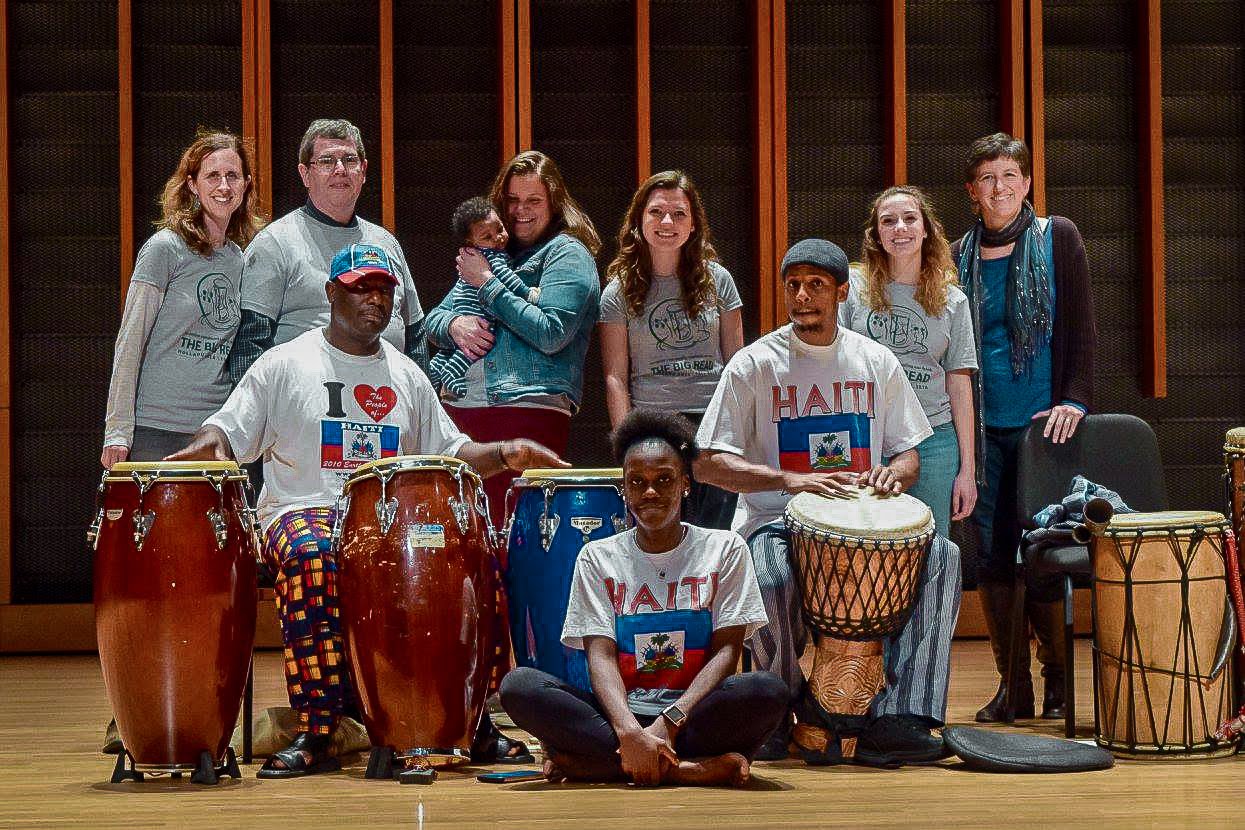Through our program, a group of high school teachers, college professors, museum and public library employees collaborated together during our month-long community-wide reading initiative centered around Edwidge Danticat’s memoir Brother, I’m Dying.
Our “classrooms” became coffee shops, church basements, art galleries, and libraries.
With our students, we learned about Haitian history and culture, the complications of the United States immigration system, and other immigrant stories. These outside events gave students access to additional “texts” that expanded on and complicated Danticat’s memoir. Using Brother, I’m Dying as a community text helped us identify the lyric spaces and braids in Danticat’s text, the lives of our students, and our own community. It helped our students to become better readers, writers, and thinkers, in turn helping our community grow stronger.
The Big Read Holland Area, run by Hope College, takes place every November in Holland, MI a small city on the eastern edge of Lake Michigan in the southwest corner of the state. The purpose of this program is to create and foster a culture where reading matters. By uniting the community in one book, the Big Read Holland used this shared experience of reading, discussing, and exploring the themes of the book as a springboard to learn from and listen to each other.
The Big Read Holland Area is a collaborative effort between over 50 partnerships including various institutions, organizations, and businesses. Its programming scope is intentionally wide and designed to attract participation across generational, cultural, racial, and socioeconomic divides and experiences. Multimodal main events include films, food, music, art, and lectures provide different perspectives, experiences, and angles for the chosen book.
Area school teachers collaborated with professional artists with the purposes of reading, discussing, and responding to Brother I’m Dying and the topic of immigration in the present day contexts of their community by artistically responding to questions such as:
- What are the complexities of immigration?
- How do we give voice to cultural identity?
- Who am I? Who are you? Who are we?
These artistic responses were displayed in a student exhibition event and were viewed by 900 community members. This allowed teachers the opportunity to champion their work, and to share and advocate for student work in the community.
About our Community Partnerships
A focus on place-based literacy includes the importance of taking learning out of the classroom and into the community (Smith, 2002; Gruenewald, 2003; Lesley & Matthews, 2009; Bartholomaeus, 2012). Doing this increases student engagement. It also fosters relationships between institutions, organizations, and individuals (librarians, teachers, community leaders, museum educators). It increases the relevance of reading classic literature and literary texts. Finally, it increases a sense of belonging in our community through access to new spaces, places, and people. Here are some thoughts from our partners:
“I love working to engage our community in ways that go beyond the traditional idea of libraries. As organizations, we’ve moved well past the days of quiet environments stocked with dusty books. The Big Read is a way to showcase that to our community while helping to create meaningful, impactful experiences.”
Abbey Stroop (Librarian, Herrick District Library)
“My focus in the library is on service–identifying needs and figuring out how the library can best fulfill them. The Big Read has served as a catalyst for identifying marginalized community members and how we can better serve them.”
Anne Harrison (Librarian, Herrick District Library)
“I’ve loved participating in The Big Read because of how I’m able to support student learning through our museum exhibitions and experiences. Historical and cultural artifacts help to bring stories to life.”
Connie Locker (Education and Outreach Manager, Holland Museum)
“My goal in working with The Big Read is to provide an opportunity for my students to be involved in the community on topics/issues that are important to our world together. Because my classroom environment is not conducive to daily group work, The Big Read also provides a chance for my students to work in small groups and learn from each other in a way they would not normally do.”
Joy Zomer (English teacher and Director of Pioneer Tech High School)
“The Big Read allows my English Education students opportunities for leadership in the community. It helps reveal to them all the different possibilities surrounding the study of literature.”
Bill Moreau (English Education professor at Hope College)
Championing Student Accomplishments
Our program included arts integration in response to literature through a co-equal approach (Bresler, 1995). This can help develop literacy skills in the community (Stevenson & Deasy, 2005; Jester, 2003) Literature can also be a catalyst for artistic representations which inspire change in a community and help students “understand literature as something meaningful and complex” and as having a “capacity to inform their lives” (Grumet, 2004, p. 67). One of the ways we championed these accomplishments was through our Exhibition of Student Learning, which includes the artwork of 1000 middle and high school students.
Community Engagement Resources for “Brother, I’m Dying”
Documentaries:
- La Belle Vie: The Good Life (2015), director Rachelle Salnave https://www.labelleviefilm.com/
- Poverty, Inc. (2014), director Michael Matheson Miller https://www.povertyinc.org
Speakers:
- God’s Vision For Haitihttps://www.godsvisionforhaiti.org/
- Bethany Christian Services – Refugee and Immigrant Services https://www.bethany.org/other-services/refugee-and-immigrant-services
- Lighthouse Immigrant Advocateshttps://lighthouseimmigrantadvocates.com/
- Justice for Our Neighbor https://jfonwestmichigan.org/
- Daniel Jean-Louis (Haitian entrepreneur)https://www.facebook.com/daniel.jeanlouis.14
- Edwidge Danticat (author)
- TED-talk style presentations by a Caribbean historian, Caribbean linguist, and a literary scholar
Workshops:
- “My family waited in line, why can’t immigrants today?” Immigration Stimulation Workshop https://justice.crcna.org/church-between-borders
Musician:
- Geraud Dimanche, master Haitian drummer (Detroit)https://www.youtube.com/watch?v=oMaRPLAv28k
Food:
- Chez Olga (Grand Rapids, MI) https://www.facebook.com/Chez-Olga-GR-132059110146754/
Websites:
Other:
- https://www.arts.gov/art-works/2016/untold-stories-big-read-helps-neighbors-learn-about-each-other
- https://www.hollandsentinel.com/news/20171109/my-take-this-is-why-i-do-big-read
- Van Duinen, D. V. & Bolhuis, A. (2015). Reading To Kill a Mockingbird in Community: Relationships and Renewal. English Journal, v105 n3 p. 81-87.
- Van Duinen, D. V. & Schoon-Tanis, K. (2015). “‘Who are Our Mockingbirds?’: Participatory Literacies in a Community-Wide Reading Program”. Journal of Language and Literacy Education v11 n1 p. 127-136.
